Session 1 – Understanding Depression
Contents
- Getting started
- Knowledge is power
- Learning path improvements exercise
- Giving yourself a break (includes Relaxed Review)
- Setting the scene
- Future improvement indicators exercise
- Session One Summary
1. Getting started
Depression and the reasons for it vary from person to person. As you progress through the Program, you may think that some of it doesn't apply to you. This may well be the case, but please take the time to complete each session, just in case it contains something you can use.
I know depression can temporarily stop things being clear. So if you need to you can revisit any stuff until it all makes perfet sense.
Take your time, there's no rush.
This program is also an opportunity for you to see what you are doing right. There may be healthy strategies that you are already using that you can do more of to reap the positive results you desire.
It's important to revisit sections of the program as often as you feel necessary and to replay the Relaxed Reviews as much as you need to ensure your new knowledge sinks in, and to help increase the amount of day-to-day relaxation you are getting.
You see, whilst people are depressed, they have higher levels of the stress hormone cortisol in their blood streams. By relaxing properly and often, you will lower your stress hormone levels and therefore feel happier, making your fight against depression an easier one.
2. Knowledge is power
By this stage, you may have read the complete Depression Learning Path. If not, don't worry, to ensure you underestand how depression works we've summarized some of the main points from the Learning Path below. This will make it easier to know what you have to do to beat depression.
What do signs of depression include?
- exhaustion on waking
- disrupted sleep, sometimes through upsetting dreams
- early morning waking and difficulty getting back to sleep
- doing less of what they used to enjoy
- difficulty concentrating during the day
- improved energy as the day goes on
- anxious worrying and intrusive upsetting thoughts
- becoming emotional or upset for no particular reason
- shortness of temper, or irritability.
Is depression due to a chemical imbalance?
No, most depressions are not caused by a chemical imbalance.
Low serotonin levels are a consequence, not a cause of most depression. There is ten times more major depression in people born after 1945 than in those born before. This clearly shows that the root cause of most depression is not a chemical imbalance. Human genes do not change that fast.
What changes in society have occurred since the end of WWII that may account for the huge increase in depression?
- breakdown of the extended family
- dispersal of communities leading to less support
- increased focus on material wealth
- overwhelming prevalence of news media
- increased focus on 'the self' over the wider community.
Why am I likely to wake up in the morning feeling exhausted if I'm depressed?
You are likely to wake in the morning feeling exhausted because when you ruminate, or introspect in a negative way, you create emotional arousal that causes the release of stress hormones.
The following night, in REM (dream sleep), you become emotionally aroused again as dreaming 'flushes out' the emotional arousal from your brain. That is why depressed people have higher levels of stress hormones, and also why you can wake up feeling exhausted. Over-worrying or negative 'rumination' makes you dream more (depressed people dream up to three times more than normal). During dreaming, also called 'REM sleep', something called your 'orientation response' becomes exhausted and serotonin production stops entirely in REM sleep. (Your orientation response is what allows you to switch your focus of attention from one thing to another. If it is exhausted you are less able to motivate yourself.) So, after a night of over-dreaming (even if you don't remember your dreams) you'll wake up with much lower levels of serotonin than normal. Daytime activity raises serotonin levels, making you feel better as the day progresses.
Why is 'all-or-nothing' thinking a possible cause and also a sign of clinical depression?
When you are stressed, your brain works differently.
You are more likely to resort to 'All-or-nothing' thinking, which causes catastrophizing, perfectionism and difficulties in solving complex problems. In turn, this creates more arousal, or stress, and so continues the 'loop', increasing the amount you dream, and so exhausting you.
3. Learning path improvements exercise
Purpose
In order to break down the all-or-nothing thinking of Depresso ("It's all terrible" or "It's all perfect"), you need to start noticing changes in the way you feel.
Signs of success
You will actually have something concrete written in your Progress Notebook that you can refer back to.
Some people report feeling more hopeful, some say that it is a relief to finally understand what is going on, and some note that they feel less depressed because they have gained more control over the situation.
Monitoring your own progress is critical to beating depression for good. This is because:
- You stay in control: If you find yourself slipping into depression in the future, you will be able to spot the signs early and know what to do to stop them.
- You understand how it works: You will see that beating depression is a process, not some magical happening, and because of such will feel much more confident that you can deal with it. Depression is as much something you 'do' as 'experience.'
- You will know you can stay well: Your confidence will increase as your understanding of the 'first principles' on how to beat depression grows.
- You will have the facts: You will have hard evidence to help you challenge the 'all-or-nothing' thinking that depression can create. It is common for depression to make you think that nothing is improving when, in fact, you have made many advances.
If you have progressed to this point without opening your Progress Notebook, please go there now and write a sentence or two about how your understanding of depression has changed and how that makes you feel better. Also, go back through the first few pages of the Program and complete the Notebook exercises. It is absolutely essential you do this. After all, you are worth it!

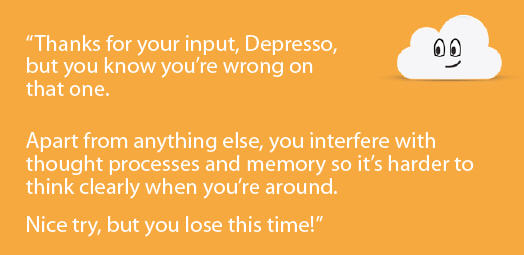
Once you've done this exercise, have a look at some of the sample answers I've got here:
- Here are some sample answers to help get your creative juices flowing...
- 'I have noticed that since absorbing the information from the learning path I have felt less threatened by depression because now I understand it so much better.'
- 'I have been able to help others who had been depressed by explaining to them simple facts about depression.'
- 'I can now see a pattern for how depression can actually lift. This has given me a tremendous amount of hope for the future.'
- 'Things I was tempted to stop doing, because of feeling so low, I have decided continue. Since learning how important exercise is in keeping up serotonin levels I've kept on going to the gym. I've even stopped doing some of the stuff that was making me feel bad such as assuming, without evidence, that I've done something wrong.
- 'The path has helped me to see that my behavior was a pattern. And my perception has been an interpretation of reality and not a reflection of it. This has given me more detachment as far as the depression is concerned and also calmed me down around it.'
- 'I feel strengthened by the fact that depression isn't some genetic 'disorder' or 'biological disease.'
- 'I also feel better because it's clear that what I have been suffering from is very common and there are many others out there in the same boat.'
Great, all done?
OK, let's move on.
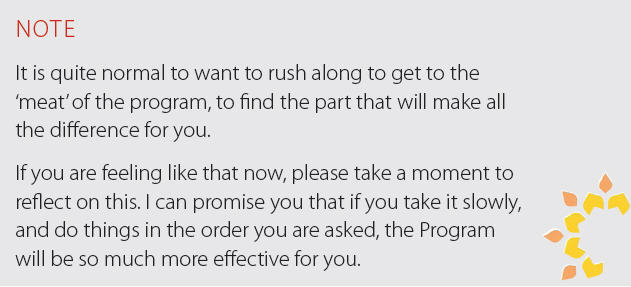
4. Giving yourself a break (includes Relaxed Review)
You'll remember from the Learning Path that the tiredness and de-motivation accompanying depression comes from several sources:
- over-dreaming causing poor sleep quality
- avoidance of pleasure-creating activities, causing lower serotonin and dopamine levels
- exhaustion of your body's stress hormones through too much emotional arousal and over-dreaming.
However, the 'reasons why' are less important than what we are going to do to break this cycle. Here's a reminder of how the depressive cycle works.
Please take just a minute to make certain you understand it completely:
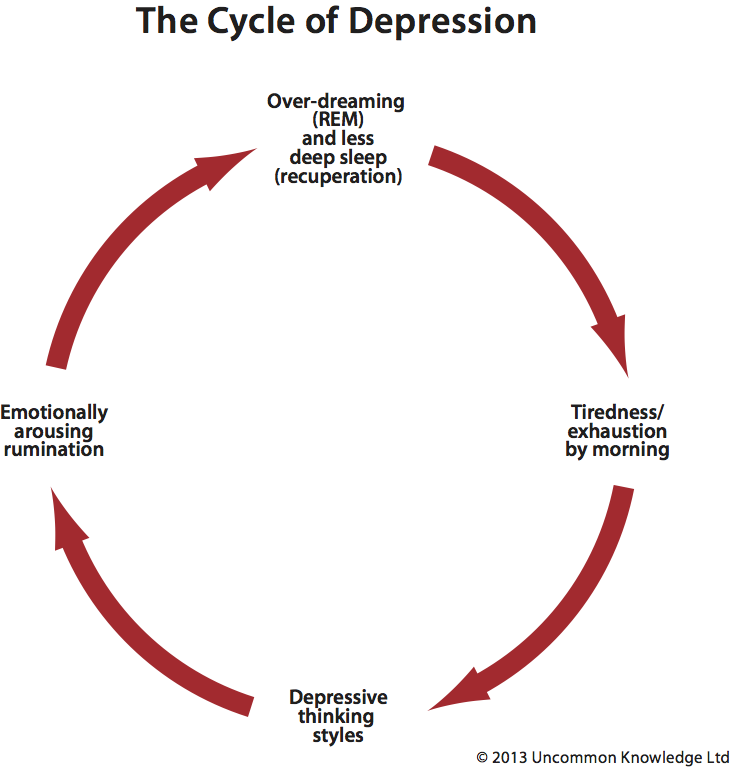
And here's a more detailed version. The intervention points are just some of the places where you can break the cycle (note how the core cycle is the same as the one in the previous diagram):
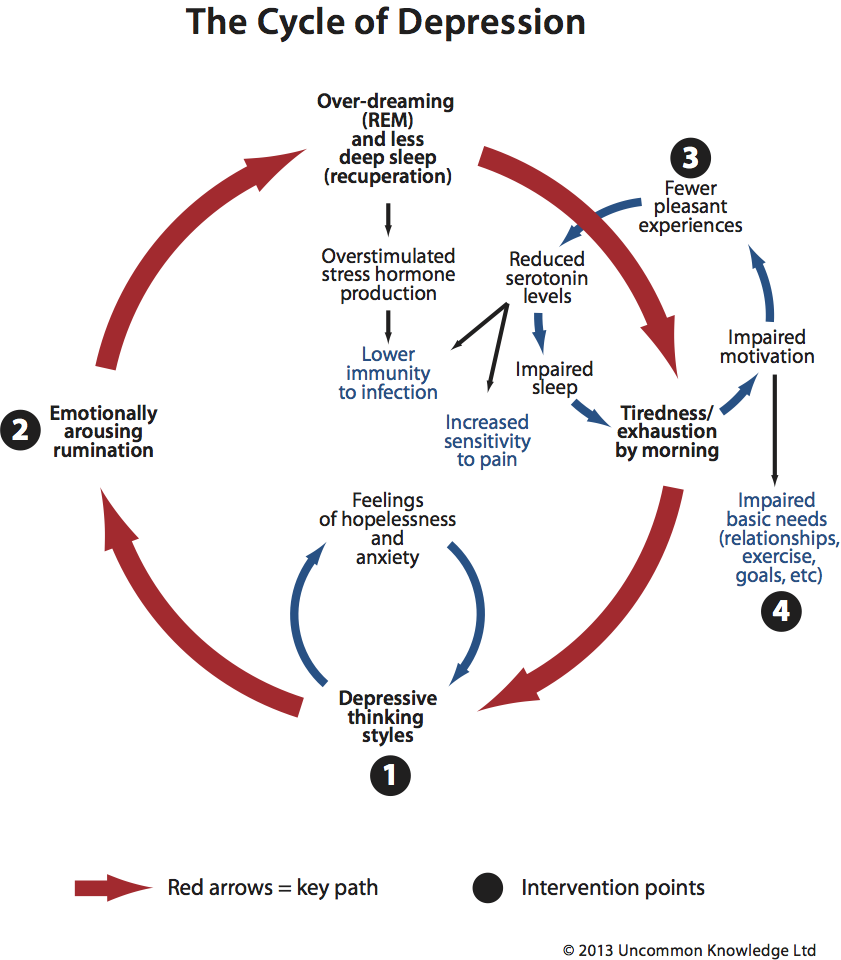
Depression makes thinking clearly very difficult
Depression can make it difficult to think clearly, to maintain concentration, and to remember things properly. That's why it can feel as if you are getting nowhere when actually, you are progressing. Depression creates a sort of 'trance state' within which things are different to the 'outside world'.
Too much dreaming (which stems from depression) causes exhaustion
So our first task is to help your brain begin to recover from the effects of too much REM sleep, exhaustion and lack of rejuvenating slow wave sleep.
The best way to do this is through deep relaxation, as this closely parallels the sort of rest your brain is missing. If you are able to do this yourself through meditation, yoga, or some other exercise, that's great.
But to make it as easy as possible, we have created Relaxed Reviews for you to listen to or download. This review will help you absorb the information we have covered thus far, while the relaxation techniques help you feel better immediately, providing you with the energy you need to continue with the Program.
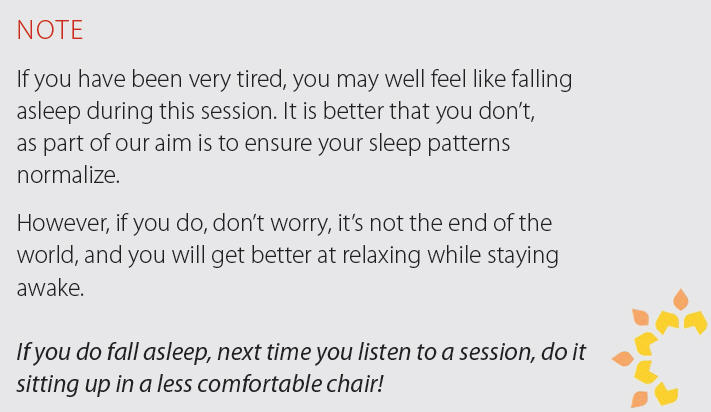
It is possible that you will feel drowsy afterward, as well. Don't drive or do anything else that requires concentration until you feel fully awake again. Remember, depression puts an incredible strain on your mind and body. Don't be surprised if your brain decides to make the most of the break! However, the good news is that you can expect to feel much better and revitalized after this session.
In addition to the rest and recuperation, another benefit of using Relaxed Reviews is that while deeply relaxed you don't ruminate, which decreases the emotional arousal, and so the amount of dreaming you do. And it's not just for the duration of the session either. The aftereffects will leave you feeling calmer for a good time afterward, as well.
To recap...
Right after you listen to the Relaxed Review, please go to your Progress Notebook and write down the ways in which you feel better.
It may be that you have a quieter mind, more energy, feel more optimistic, or something else entirely.
Whatever it is, just make sure you make a note of it now.
Note your improvements
From now all the way through to the end of the Program, I would like to ask you to make sure that you listen to a Relaxed Review at least once a day.
I will give you reminders as you go along, but please give yourself the time to do this. It is an essential part of beating depression, especially early in the Program.
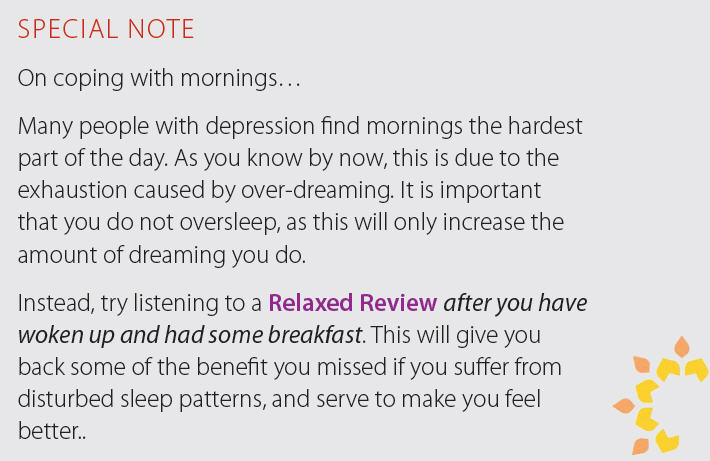
5. Setting the scene
As you may have noticed, depression tends to make you think about all the things that are wrong, have gone wrong, and are likely to go wrong. Although depression tends to get in the way of thinking clearly, if you spend a lot of time thinking in this way, you are bound to feel depressed.
To counteract this, and to begin to set down a 'template' for improvement, in the next section I'm going to ask you to do a task.
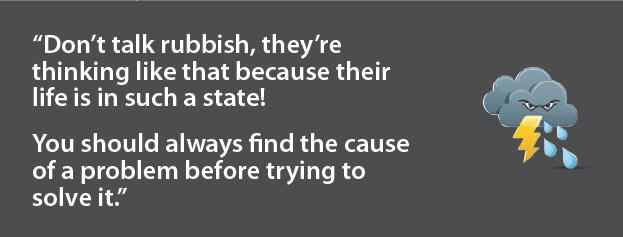
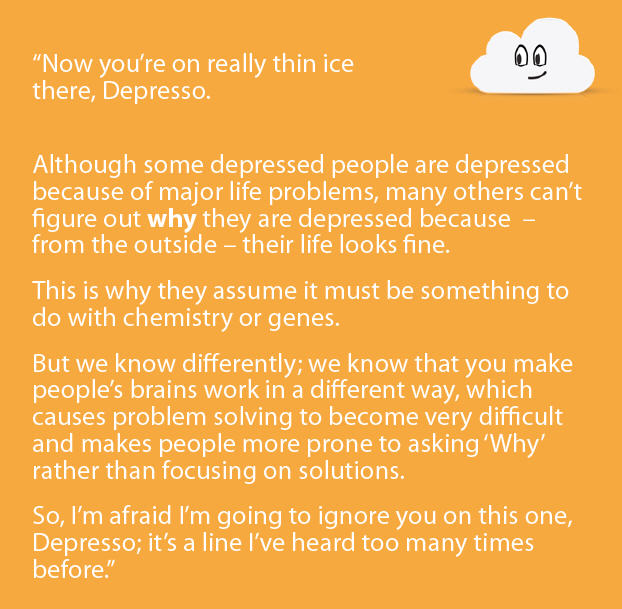
6. Future improvement indicators exercise
Purpose
To get you thinking how things will be when depression starts to lift. This is a key stage in having your brain focus on things other than Depresso's ideas.
Signs of success
You will have definite improvement indicators written in your Progress Notebook and, perhaps more importantly, you will have them at the 'front of your mind' from day to day.
These are commonly things like:
- waking up with some energy
- feeling more hopeful about beating depression
- once again participating in something you enjoyed previously
- being able to feel calmer in stressful situations
- feeling more like 'the real you'.
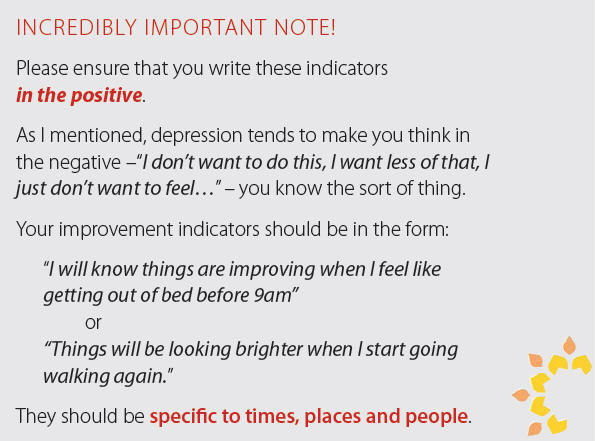
This is a key step in the process, because the things you write here will be your signposts on the road to recovery. They will let you know that things are improving, which will keep you motivated and increase your hope. Remember to write at least 3, and if you get on a roll, keep on writing! You can return to this any time you have a thought about something else you'll be doing when you are starting to feel better.
Here are some of my ideas:
Sample answers...
- 'I'll know when I'm feeling better because I'll start having more energy again. Not only will I wake up with more energy but I'll feeling like playing sports again.'
- 'I'll start to see the funny side to things once again. I know my sense of humor is in there somewhere!'
- 'I will also start thinking about going back to work again. I'll be able to do this because I'll have more energy and will be calmer. This will also improve my financial situation and therefore I'll feel more relaxed about my situation generally.'
- 'I will be able to spend more time with and give more attention to my partner. This will make us both happier.'
- 'Come to think of it I'll be able to direct more attention to my friends. I'll be more relaxed (and more fun to be around).'
- 'I'll be able to actually get enjoyment from stuff I used to enjoy such as watching old movies.'
- 'I will get my appetite back and start enjoying my food again!'
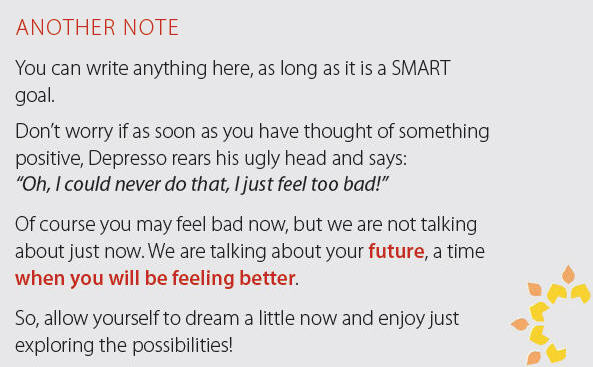
Read more about Writing SMART goals here (this is part of a larger guide about setting goals).
7. Session One Summary
Depression
- is a cycle that needs to be maintained by introspection and inactivity
- makes clear thinking hard, due to exhaustion and emotional arousal changing the way the brain works
- creates a sort of 'trance state', within which things are different to how they are in the 'outside world'.
Relaxation is essential to
- give your brain a break
- help your body recuperate
- lower anxiety levels and
- help you think more clearly.
To recover from depression, you need a clear idea of how you want things to be, not just thoughts of what you want to get rid of.
Excellent! You have completed the first session!
In Session 2 we'll be looking at practical problem solving – or how to make mountainous problems into molehills.
Upgrade for Full Access to the Natural Depression Treatment program



